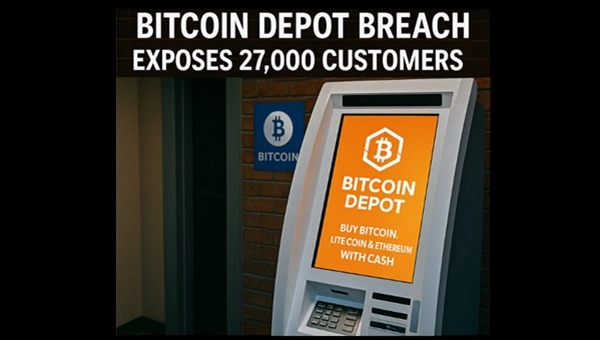

Bitcoin Depot: Operations and Market Presence
Based in Atlanta, Bitcoin Depot runs more than 8,800 cryptocurrency ATMs across the U.S., Canada, and Australia. Its machines, commonly found in gas stations and convenience stores, simplify crypto access by letting people buy Bitcoin with cash or convert crypto to fiat.
With 259 kiosks in Michigan and $33 million in Q1 2025 profits, Bitcoin Depot commands a 20% profit margin, clear evidence of strong demand.
That popularity, however, brings vulnerabilities. Crypto ATMs operate with fewer safeguards than centralized exchanges, and blockchain’s irreversible nature makes scams harder to undo. In 2024, the FBI reported $247 million in losses tied to crypto ATM fraud, 31% up from 2023. Many of the scams target older users, often through impersonation tactics.

The June 2024 Data Breach
The June 2024 breach exposed sensitive customer data, putting victims at risk of identity theft and fraud. Bitcoin Depot says there’s no sign the information has been misused, but the year-long silence has drawn criticism. Industry experts argue that delaying disclosure, even during investigations, undermines trust and exposes users to prolonged risk.
As blockchain tech reaches wider audiences, incidents like this are likely to become more common.. Byte Federal reported a breach in December 2024 that impacted 58,000 users due to third-party software flaws. Around the same time, Coinbase dealt with a $20 million ransom attempt linked to compromised contractors. The pattern suggests broader weaknesses in crypto infrastructure.
Challenges with Law Enforcement
In 2025 alone, over 16 billion credentials were exposed globally. Analysts like Coinbase’s Conor Grogan have also flagged suspicious activity, including the recent resurfacing of dormant Bitcoin wallets worth billions, events that highlight lingering concerns over private key management.
While enforcement agencies are recovering stolen funds, like the nearly $400 million traced by the U.S. Secret Service over the past decade, security often lags behind user adoption. Bitcoin Depot’s experience is a sharp reminder that rapid growth without resilient protections can backfire.
Bitcoin Depot’s challenges aren’t limited to cybersecurity. In June 2025, the company criticized law enforcement after officers in Texas seized $32,000 from one of its ATMs to recover funds from a scam. The company argues that deposited funds belong to Bitcoin Depot until transactions are finalized, placing the blame on scammers rather than the company.
The incident has stirred controversy over property rights and victim compensation.
Legislative and Regulatory Responses
This backdrop has given momentum to proposed legislation like the Crypto ATM Fraud Prevention Act, which would enforce transaction caps and mandate blockchain address tracking.
As a public company, Bitcoin Depot employs former law enforcement agents to help bridge gaps with authorities. Still, experts say relying on third-party software remains a risk. Investing in internal security infrastructure and conducting regular audits are becoming non-negotiable.
States are taking initiative. Illinois and Rhode Island now require blockchain addresses on receipts, Vermont caps daily crypto ATM transactions at $1,000, and Nebraska limits fees and enforces quarterly reporting. Yet these are piecemeal efforts. A cohesive federal framework could provide consistent safeguards without stifling innovation.
The Path Forward
With more than 38,800 crypto ATMs in operation globally and over 80% of them in the U.S., industry leaders like Bitcoin Depot have a responsibility to lead on security. Users should stay alert, verify transactions, and never respond to unsolicited requests. For its part, the company must prioritize transparency, strengthen its digital defenses, and work closely with regulators.
Handled well, this breach could become a turning point. Bitcoin Depot has the scale and visibility to help shape the future of crypto ATM regulation and ensure that access to digital assets doesn’t come at the cost of user safety.
He has worked with several companies in the past including Economy Watch, and Milkroad. Finds writing for BitEdge highly satisfying as he gets an opportunity to share his knowledge with a broad community of gamblers.
Nationality
Kenyan
Lives In
Cape Town
University
Kenyatta University and USIU
Degree
Economics, Finance and Journalism


Facts Checked by Nakul Shah

 Fact checked by
Fact checked by 
 eabungana@gmail.com
eabungana@gmail.com 